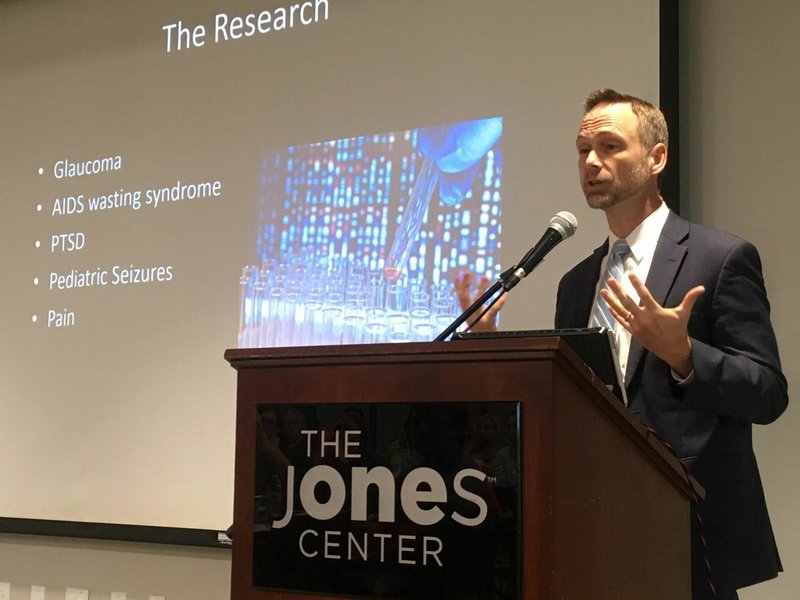SPRINGDALE -- Legalizing marijuana will not improve the state's opioid problem, local and state drug experts said Thursday at a drug abuse prevention conference.
The first NWA Drug Prevention Conference drew more than 120 people to The Jones Center, including parents and educators from across the state concerned about overmedicated and undereducated Arkansans. The regional prevention task force planned the event with money from Decision Point, a nonprofit drug counseling provider.
Dr. Greg Bledsoe, Arkansas surgeon general, told the audience he hasn't seen sufficient research proving legalizing marijuana will lead to a decrease of opioid use in Arkansas as some have alleged.
Opioids, prescribed as painkillers, were involved in five times more overdose deaths in 2016 than in 1999, according to the federal Centers for Disease Control and Prevention. A 2017 Arkansas Department of Health report shows a higher rate of painkiller misuse in Arkansas than in bordering states. Between 2015 and 2016, 4.89 percent of Arkansans over age 12 took painkillers for nonmedical use, according to the report.
Arkansas legalized medical cannabis for a number of illnesses when voters approved Amendment 98 to the Arkansas Constitution in November 2016. The state's Medical Marijuana Commission has faced legal obstacles in issuing licenses to grow medical cannabis. Circuit Judge Wendell Griffen stalled progress with his order in March that declared the scoring and licensing system unconstitutional and "null and void."
A 2017 report from the National Academies of Science, Engineering and Medicine found evidence to support marijuana as an effective pain reliever.
Little Rock lawyer David Couch, who drafted the medical marijuana amendment, said other states with legalized medical marijuana, such as Colorado, have seen a decrease in opioid-related deaths, as proof medical marijuana saves lives.
"No one in the history of the world has ever died from marijuana (overdose)," Couch said.
Bledsoe said studies claiming overdose deaths decrease with marijuana legalization involved patient populations unique to other states and don't apply in Arkansas. Bledsoe acknowledged some studies show a correlation between the two, but he thinks it's wrong to directly link marijuana legalization as a cause for the decrease in overdose deaths, he said.
He also warned of negative side effects. Regular users, particularly users age 25 and younger, are more likely to develop a dependence on the drug, lose intellectual functions, develop or worsen anxiety and depression and cause a traffic accident, Bledsoe said.
"People don't believe there's any danger to it, and that's an unfortunate side effect of the political push to legalize marijuana," Bledsoe said.
Couch views these risks as a problem with recreational legalization, not medical legalization, he said.
Tyler Moore, a Fayetteville Police detective representing the 4th Judicial District Drug Task Force, taught a session on local drug trends and what he called medical marijuana myths.
Some people think legalizing marijuana will put marijuana dealers out of business, but dealers will find a new drug to sell, Moore said.
Arkansas Drug Director Kirk Lane declared opioids a deadly threat to Arkansans in his keynote speech. Lane said he isn't against opioid prescriptions, but is against what they have caused: an opioid-dependent population.
Last year, 108 opioid prescriptions were written per 100 people in Arkansas, according to the state Health Department. The rate decreased since 2015 when nearly 118 prescriptions were written per 100 residents.
Marty Hausam, re-entry programs manager for Goodwill Industries of Arkansas, said schools and businesses need to improve education efforts when it comes to storing drugs at home, treating patients with addiction and considering people for hire who are honest about a previous addiction, she said.
Leah Johns, a mother and school nurse at Lowell Elementary School in the Rogers School District, said she wants children to better understand their bodies and how to handle pain. Elementary students should watch a video that teaches how drugs and other substances affect their health in addition to personal hygiene and puberty videos, she said.
Bledsoe stressed awareness of harmful drug use and adequate research to avoid repeating an epidemic. He worries Arkansas might face a marijuana epidemic similar to the opioid epidemic, he said.
"Every institution all the way up to the federal government needs to be reflective of what caused this horrible epidemic so that it never happens again," he said.
NW News on 06/02/2018

